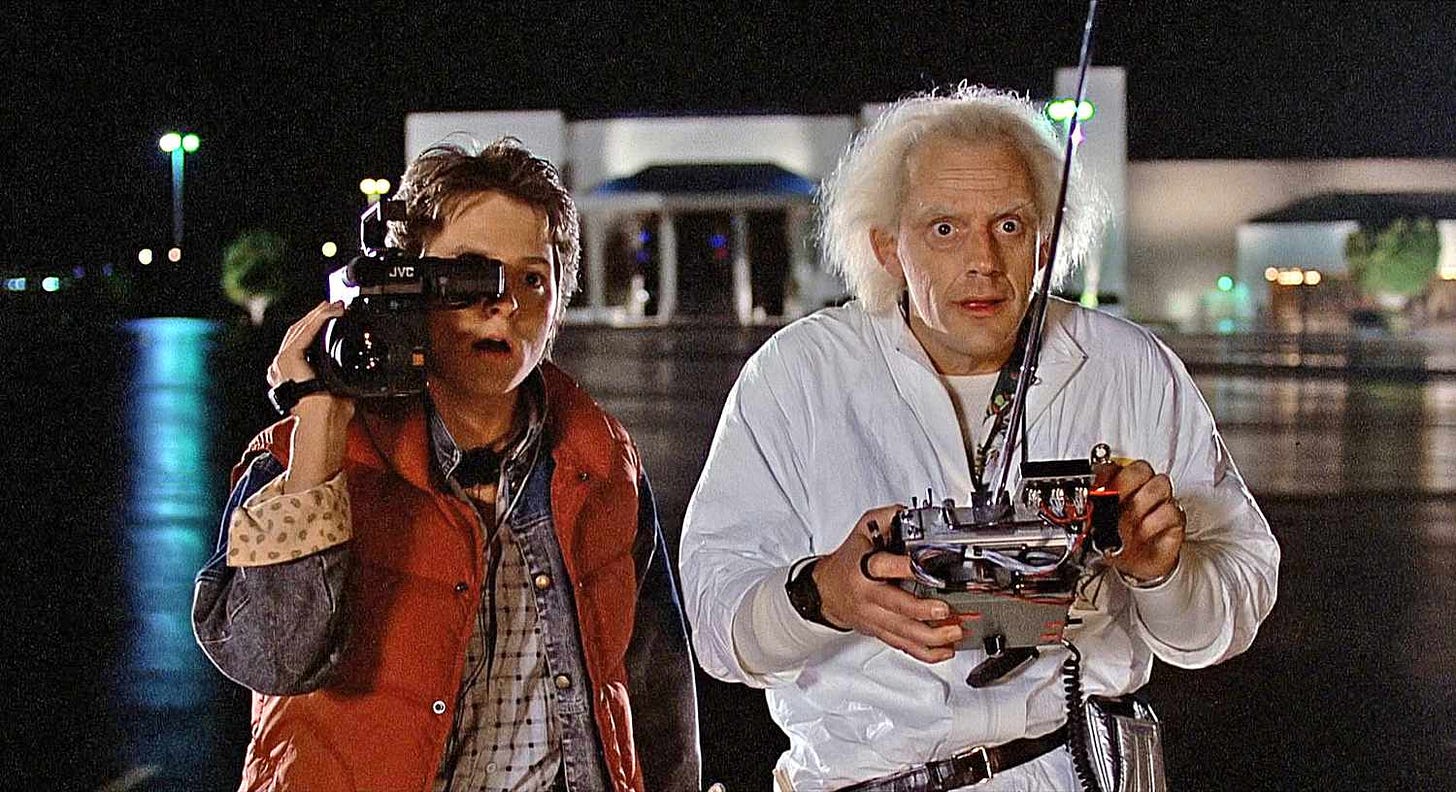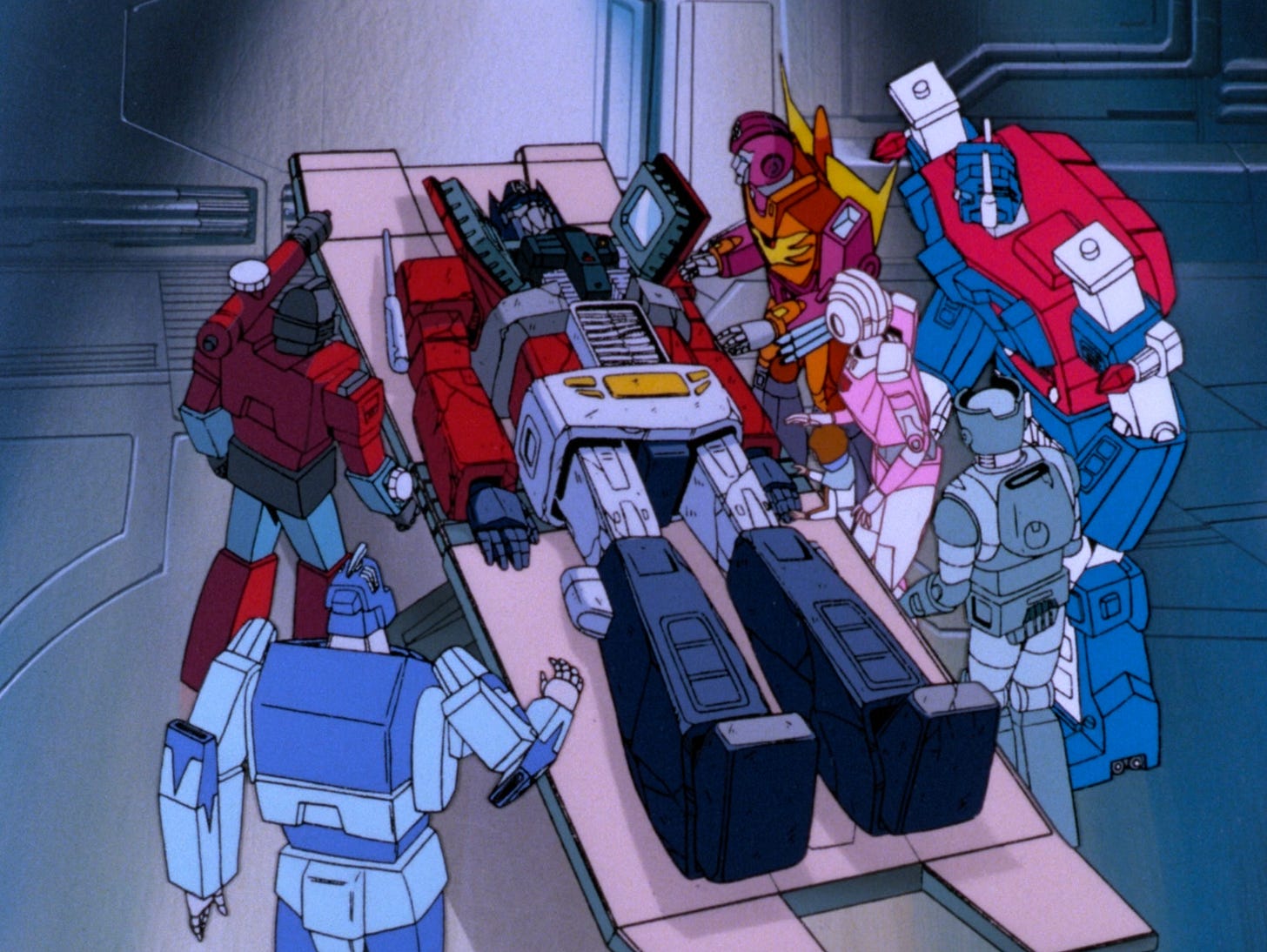1985 and 1986: BACK TO THE FUTURE and THE TRANSFORMERS: THE MOVIE
I am *really* bad at remembering to send out these emails!
So again, I’ve started a project called A Life in Film where I’m writing about a movie for every year I’ve been alive. The full essays live on my personal site, but I’m using the newsletter here to keep people hepped on what’s up. In the chaos of life, I forgot to send one of these out for 1985’s entry, so I’m doubling up ‘85 and ‘86 here!
1985: Things Have Turned Out Just Fine
BACK TO THE FUTURE (dir. Robert Zemeckis)
Let’s start by acknowledging something: I don’t know that there’s a ton I can say about Back to the Future as a standalone movie that hasn’t already been said. The discourse is pretty well-developed: it’s a beloved classic for a reason; it’s a great use of the talents of Michael J. Fox, Lea Thompson, Christopher Lloyd, and Tom Wilson; the bit about Marty teaching Chuck Berry about rock and roll is pretty problematic; one joke does lean a little too hard on the idea of Huey Lewis being a super loud rock and roller; and the timing of the climactic power-the-car-with-a-lightning-bolt scene makes no damn sense, no matter how exciting the scene is.
Oh, and the collected Freudians of the world must have collectively shit their pants when this movie came out and was a hit.
Anyway, rather than focus on the specifics of Back to the Future, I wanted to use the movie to pull back and talk more widely about a commonality I’ve noticed in a whole bunch of time travel movies. This, after all, is one of the most famous of the genre, and it’s probably the one that I’ve spent the most time thinking about.
There’s a truism that science fiction isn’t really about the future, but instead about the present. Along the same lines, after years of thinking about Back to the Future and other stories like it, I’ve come to realize that time travel stories where someone goes back in time from the present* almost always wind up being narrative arguments that the present, however flawed it might seem to be, actually is exactly the way it has to be (or at least pretty close) and that it’s disastrous to entertain the possibility of it turning out some other way.
1986: A Ton of Bricks
THE TRANSFORMERS: THE MOVIE (dir. Nelson Shin)
And here’s another one that I’m not really about to call a great movie, or even a good movie.* ** But, to me at least, there are some ways that The Transformers: The Movie is an interesting movie. And if I’m reading my own concept for this project to indicate that I should be talking about movies that were important to me in their year (and I don’t always read it this way, but I definitely do sometimes), well this one couldn’t be more relevant; I think Return of the Jedi is the only other movie that came out within the timeframe covered so far that Young Me was as hyped about in advance as this one.
*And even if Transformers ’86 isn’t really a good movie, it’s far, far better than the Bay Transformers movies, or even its peer in late-80s animated toy commercialdom, the GI Joe movie.
**OK, but also: how hard must Jack Kirby have sighed whenever he heard that the big bad in this new movie was a godlike planet-eating space monster? Like, I know the Transformers movie and the comics were completely different things (and Kirby of course had no direct connection with either of them), but still, it’s all adjacent enough that he had to have heard about it at some point.
And I don’t think I’m alone in that; in fact, I think part of what does give Transformers ’86 a little bit of interesting heft in 2024 is that this fucker hit a lot of Gen X like a ton of bricks, and this was the cohort that would go on a few years later to start early-adopting the internet. One of my very first online experiences—aside from endlessly looking up people’s guesses at R.E.M. lyrics—was reading an extended, heartfelt post on some message board about how Optimus Prime and Megatron were archetypal figures while Rodimus Prime and Galvatron were flawed and “realistic” and this shift indicated a move from DC-style storytelling to Marvel-style and, well, I’m not saying this particular line of analysis is one that I’ve spent a lot of time on, but this type of analysis is going on more or less constantly in my head all the time and I think this goddamned post on Usenet or wherever is what kicked it all off. A bunch of us spent the 90s using this cool new interconnected web toy thing-o teaching ourselves to collaboratively dig through the semiotics of pop culture.
OK, but about this movie hitting a chunk of Gen X like a ton of bricks: it’s really hard to overstate how fucking hard this movie goes in its first half hour or so, and how psychologically unprepared everyone was (especially in the spoiler-reduced pre-internet era under discussion, double especially when you consider that the intended audience for this thing was children). Hasbro wanted to sell an entirely new line of Transformers toys (and to be clear: the cartoon that we were all so into was very literally just a big, very successful toy commercial that occasionally managed to rise above its mercenary origins), so a core part of the creative brief of the movie was kill off all the old characters to make room for new ones. Maybe it mattered here that these were robots getting killed instead of people, so it was seen as OK to show them getting mowed down like it was the Western Front in 1915. But, speaking from experience, that robots-people distinction wasn’t as clean a line in the minds of some of the audience.





